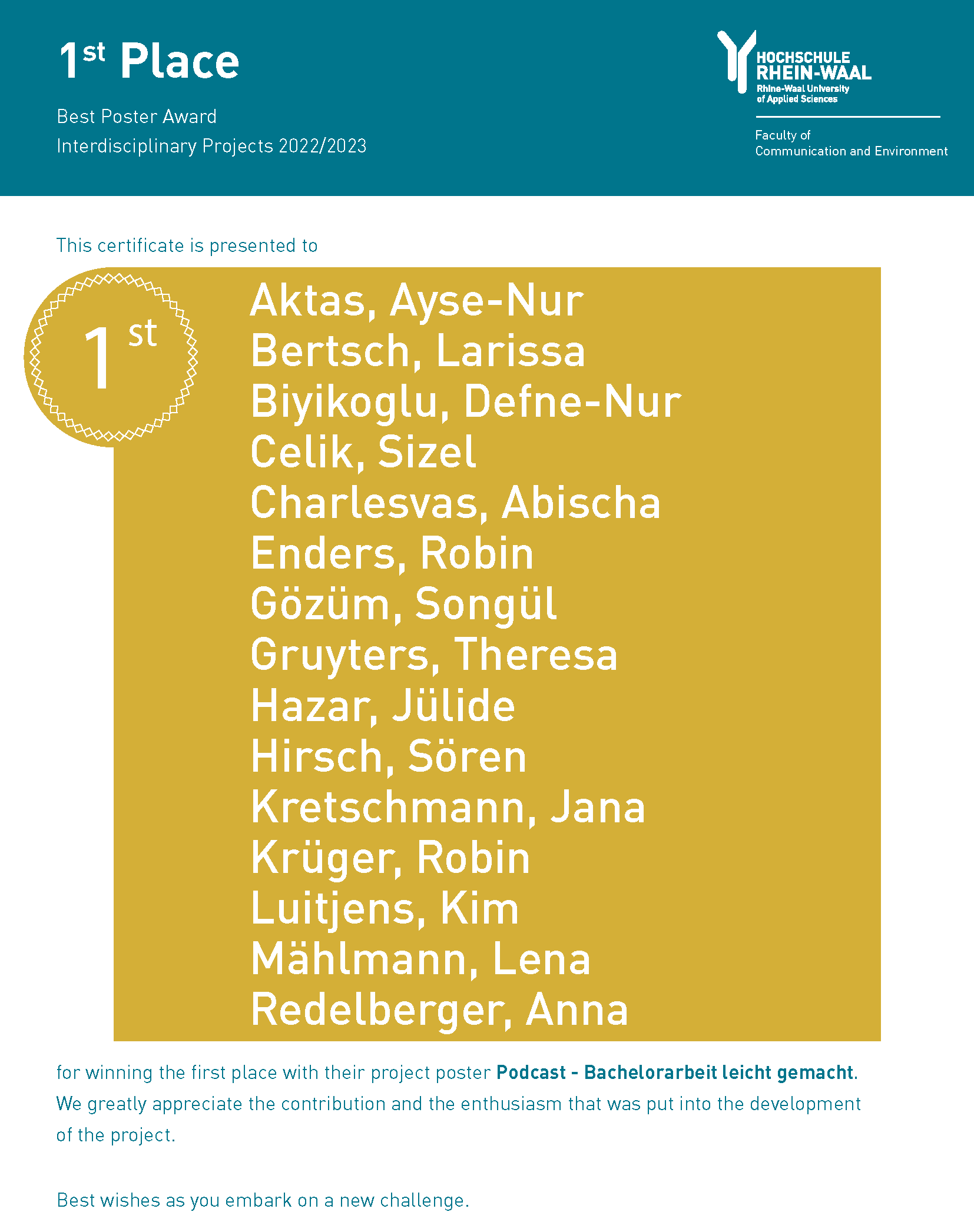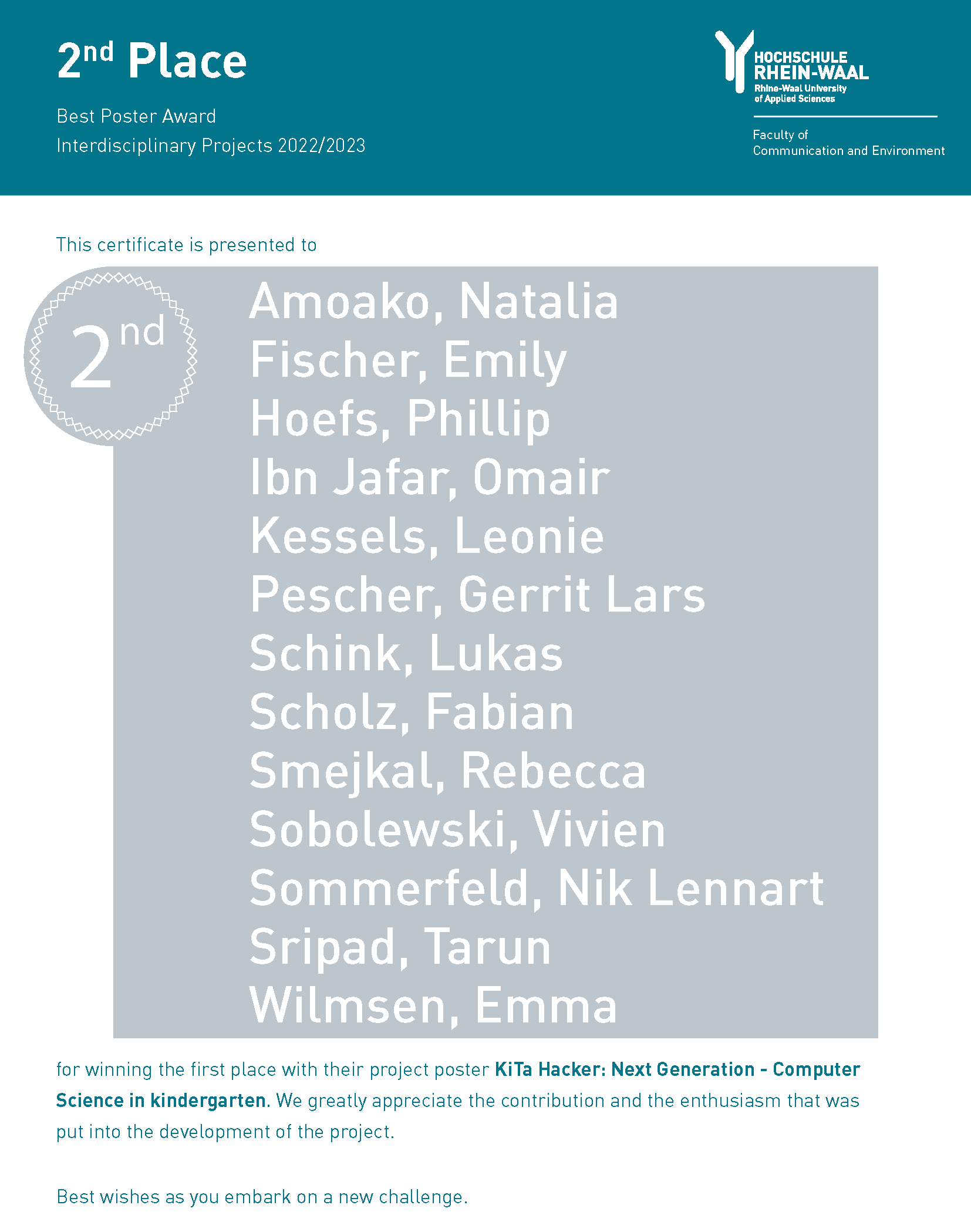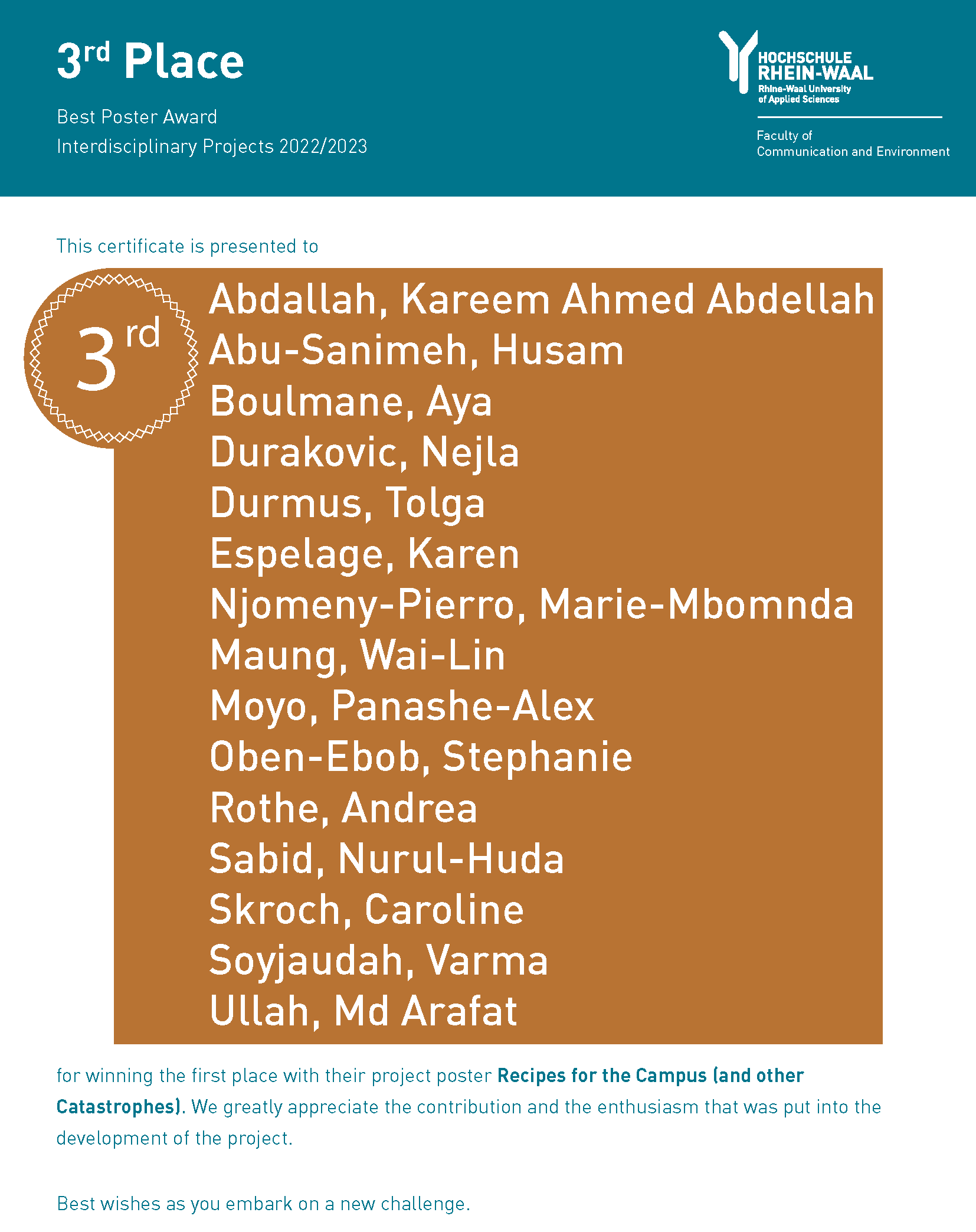Poster Award 2022/23
An integral part of every degree programme at the Faculty of Communication and Environment is an interdisciplinary project in the 5th semester. This year again, numerous project groups dealt with a wide variety of research topics and presented their results at a poster session. Afterwards the jury announced the following winners:
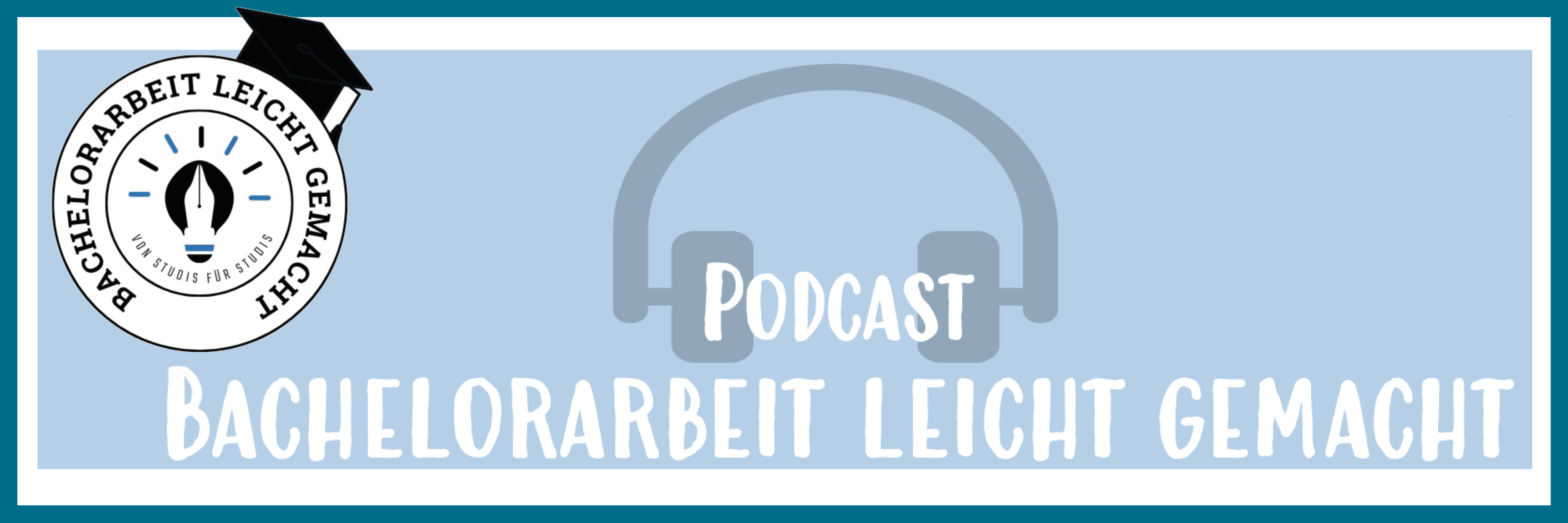
The first place
went to Ayse-Nur Aktas, Larissa Bertsch, Defne-Nur Biyikoglu, Sizel Celik, Abischa Charlesvas, Robin Enders, Songül Gözüm, Theresa Gruyters, Jülide Hazar, Sören Hirsch, Jana Kretschmann, Robin Krüger, Kim Luitjens, Lena Mählmann and Anna Redelberger with their project poster on the topic "Podcast - Bachelor thesis made easy". Supervised by Professor Dr Georg Hauck, Verena Schürmann, M.Sc. and Dr Thomas Laubach, the students of the degree programmes Industrial and Organizational Psychology, B.Sc., International Business Administration, B.A., Media Communication and Computer Sciences, B.Sc. and International Management and Psychology, M.Sc. aimed to reduce students' uncertainties and worries during the thesis phase. Based on a needs analysis, the participants produced four content and organisation-related as well as four motivational and supportive podcast episodes on the topic of "Bachelor's Thesis". In addition to developing a logo and a jingle for the podcast, they investigated how the podcast episodes could be published and sustainably integrated into teaching. In the future, all episodes will be available on the Moodle learning platform.

Second place
went to Natalia Amoako, Emily Fischer, Phillip Hoefs, Omair Ibn Jafar, Leonie Kessels, Gerrit Lars Pescher, Lukas Schink, Fabian Scholz, Rebecca Smejkal, Vivien Sobolewski, Nik Lennart Sommerfeld, Tarun Sripad, and Emma Wilmsen. In their project "KiTa Hacker: Next Generation - Computer Science in kindergarten", the team members of the bachelor degree programmes Industrial and Organizational Psychology, Media Communication and Computer Sciences, Infotronic Systems Engineering, International Business Administration, as well as E-Government, dealt with the promotion of STEM subjects. Inspired by foundations sponsored by the Federal Ministry of Education and Research, such as the "Haus der kleinen Forscher" (House of Little Researchers), the students wanted to show that an early engagement with computer science or STEM has a positive effect on the future and the development of children. They also aimed at encouraging the increased use of existing teaching materials in kindergartens and schools in Germany. Since the percentage of women in computer science is still comparatively low in Germany, students also investigated whether a significant difference in the learning behaviour of boys and girls could already be observed at pre-school age. In the course of the project, which was supervised by Dr Christina Mika-Michalski, they tested three different games with a computer science background in regional kindergartens. They found that all the children enjoyed the games and that the learning effect was great. The feedback from the kindergarten teachers was consistently positive. Both children and teachers responded positively to the games. In addition, the students were able to observe learning effects through repeated play of the games.
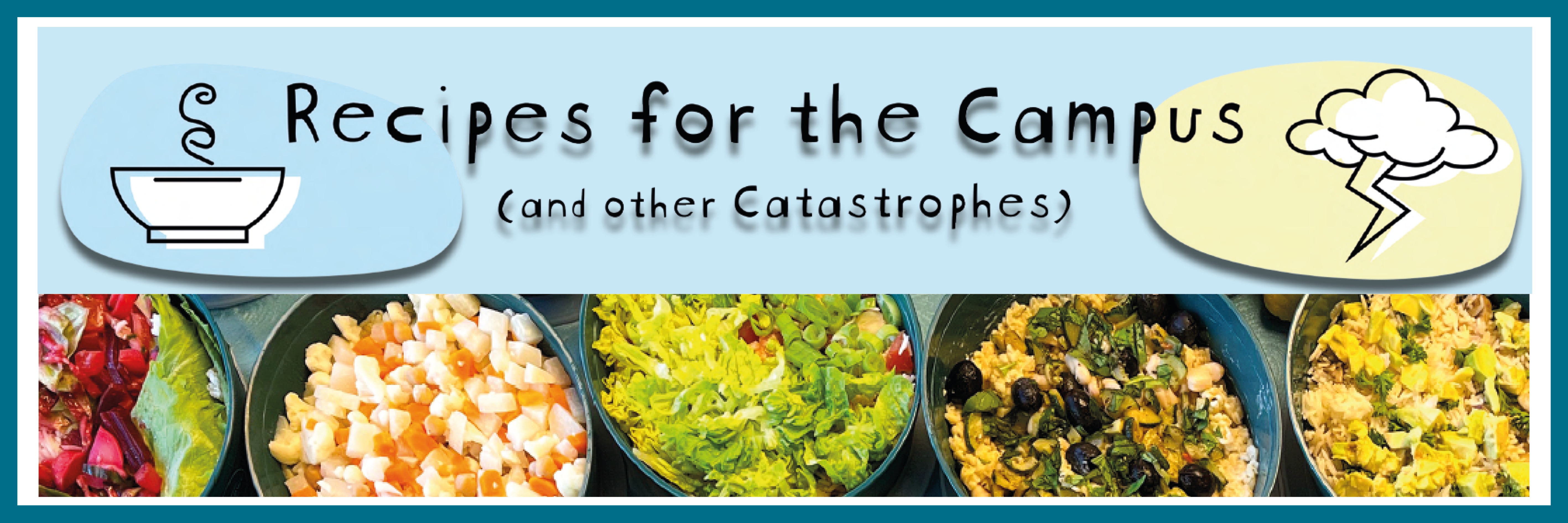
Third place
was won by Kareem Ahmed Abdellah Abdallah, Husam Abu-Sanimeh, Aya Boulmane, Nejla Durakovic, Tolga Durmus, Karen Espelage, Marie-Mbomnda Njomeny-Pierro, Wai-Lin Maung, Panashe-Alex Moyo, Stephanie Oben-Ebob, Andrea Rothe, Nurul-Huda Sabid, Caroline Skroch, Varma Soyjaudah and Md Arafat Ullah. In their project "Recipes for the Campus (and other Catastrophes)", which was supervised by Professor Dr Dieter Kopetz, the students tried to find out which recipes are suitable for worldwide emergency and disaster relief. To investigate this question, they evaluated 50 recipes over a period of six weeks. They assessed the quality of the products, the global acceptance of the ingredients, their taste and smell as well as the duration of preparation. After some improvements, such as replacing allergenic ingredients with non-allergenic alternatives, 20 recipes were finally selected for a cookbook, which was published at https://www.campusideas.de.
Congratulations!

